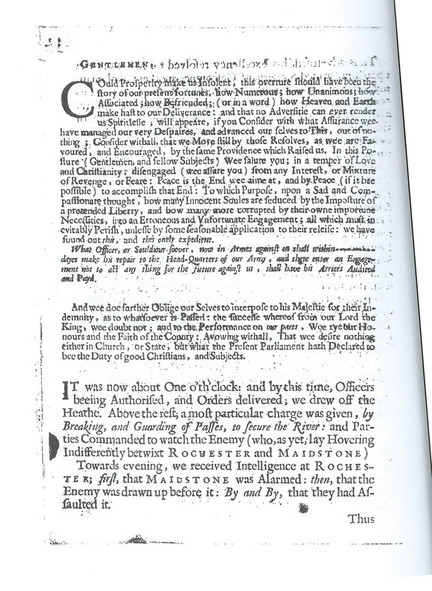 A page from Roger L'Estrange's 'Vindication'
A page from Roger L'Estrange's 'Vindication' Beginning my current work in progress, an as yet unnamed sequel to For the King, or if you like, the further adventures of Roger L’Estrange, I was delighted to discover a booklet written (and printed) by Roger himself in 1649. It's amazing what you can find on Amazon! So, filled with excitement, I sent for it. But no 'look inside' here! So I was not quite sure what I was getting.
When it arrived, I realised I had set myself a task and a half. It is a facsimile copy of the original. but the print is also smudged, badly so in places. In other places it is so faded as to be unreadable, and all but impossible to guess the words. Odd spots or blots also turn up on it. But then, it is from an original copy, so one must expect these things.
The type itself is sometimes ordinary size, sometimes small, sometimes capitals, sometimes italics. Colons and semi-colons turn up almost every couple of words and in places where a comma or full stop would have done the job. Some sentences are incredibly long, so that I lose the thread. Words we no longer use send me to the on-line dictionary. But even the good old Oxford English Dictionary was confounded by 'accompt', which I guess from the context means something like 'account'. However that doesn't seem to fit the context in this sentence: 'Upon this Accompt, I haftened back, and gave this Iffue to the difpute'. The nearest the dictionary came to that was a French word meaning 'deposit', which could, at a stretch, fit the context.
Add to that, Roger was a Latin scholar (he knew five or six languages) and so the text is liberally peppered with Latin sayings. If anyone can tell me what 'Stultorum Bethl'em; Nebulonum, Regia Bridewell: Vtrum [Utrum?] barum mavis, Ingrediare, licet' means, I shall be eternally grateful.
As if that were not enough, as you probably noticed from a quote above, most of the lower case Ss are Fs, upper case Us are Vs, and some times the Ws are VV. Strange spellings too. Such as ‘phancie’ (fancy) and ‘neceffitie’ (necessity). I puzzled over a word, which looked like ‘falure’ (and so I thought it was ‘failure’ which did not fit the context) only to discover it was ‘salute’! The lower case Ts are so small and smudged, they often look like Rs.
Old fashioned terms come into it. Anyone know what ‘oyer and terminer’ is? No? Well, it’s a legal term, I discovered, regarding a specially appointed court. And the same court jury returned a verdict of ‘ignoramus’. No, that does not mean the defendant was an idiot! It comes from ‘ignorant’, literally, ‘we don’t know’, or the case 'not proven'. May Google be forever blessed!
When I am trying to pick out the facts and events, it makes the job much harder, so I’ve decided the only recourse is to type it out in full, with modern spelling and modern punctuation, so that I can make sense of it.
I was fortunate. Roger had this booklet printed. Handwritten documents are a bigger challenge, and I feel for those writers dealing with them. Yet at the same time, I rejoice. For there is nothing quite like getting your eyes on original documents.
FOR THE KING Roger L'Estrange and the Siege of King's Lynn is OUT NOW!
Available on Kindle and print
CLICK HERE TO BUY

 RSS Feed
RSS Feed



